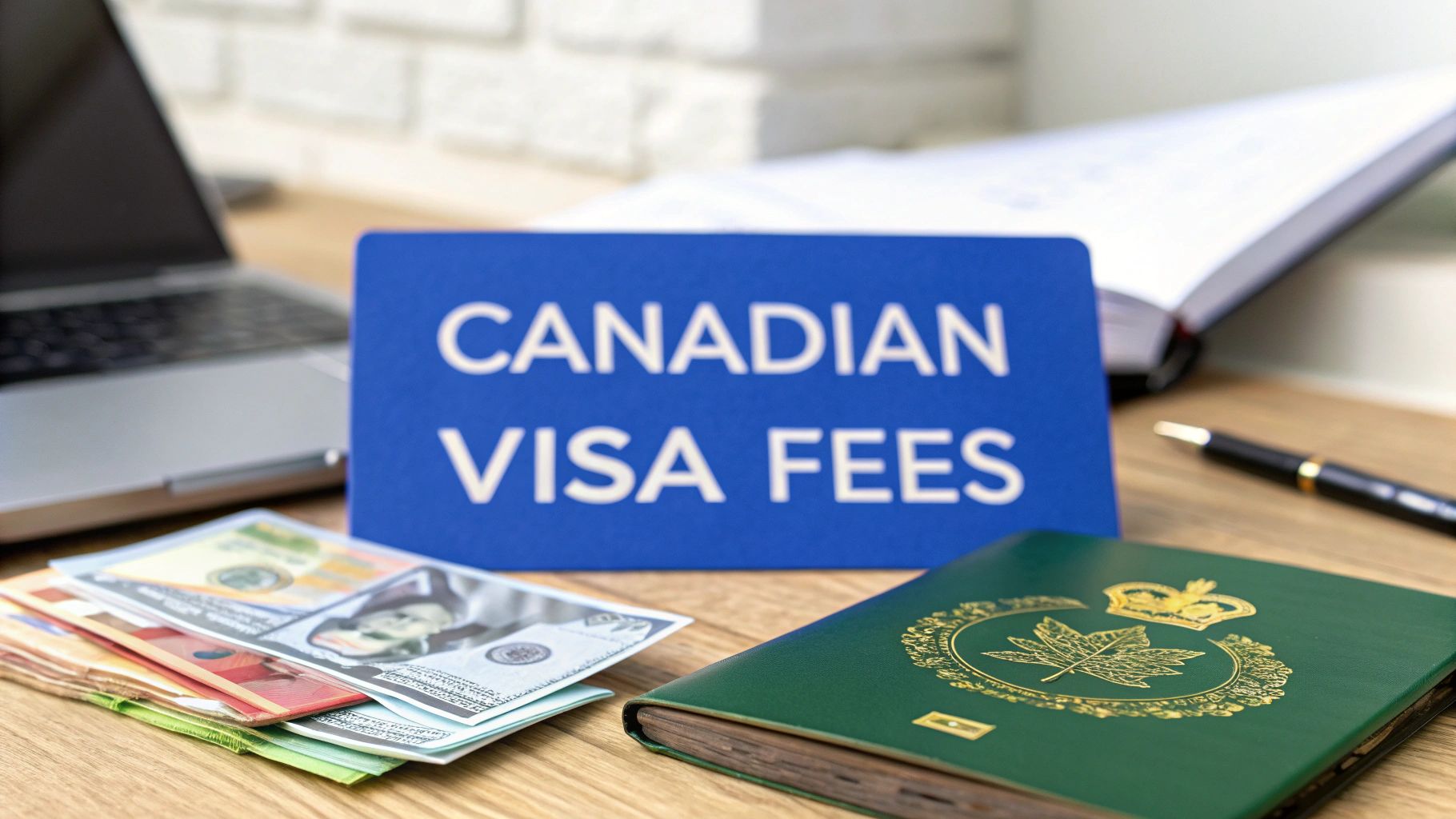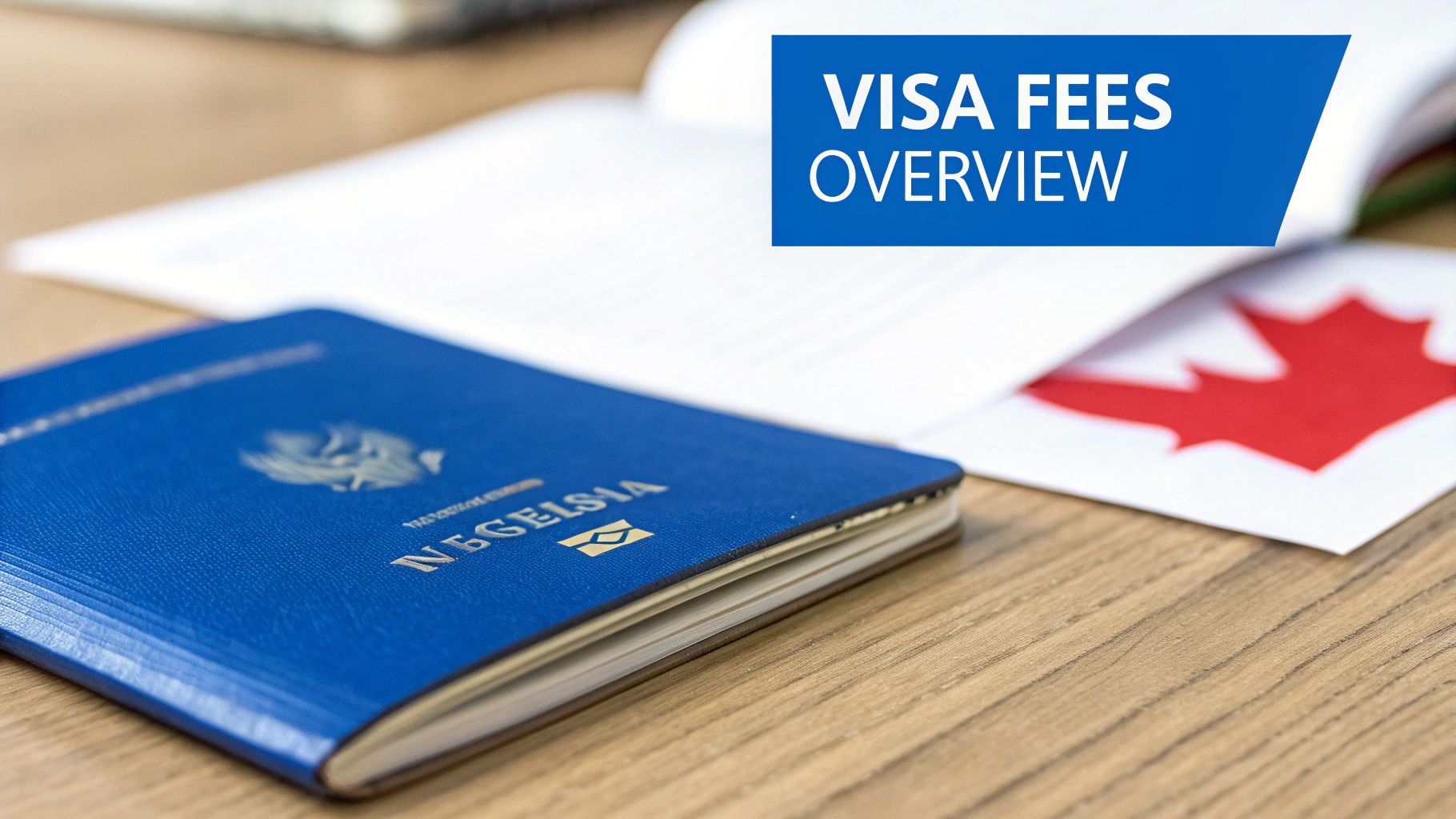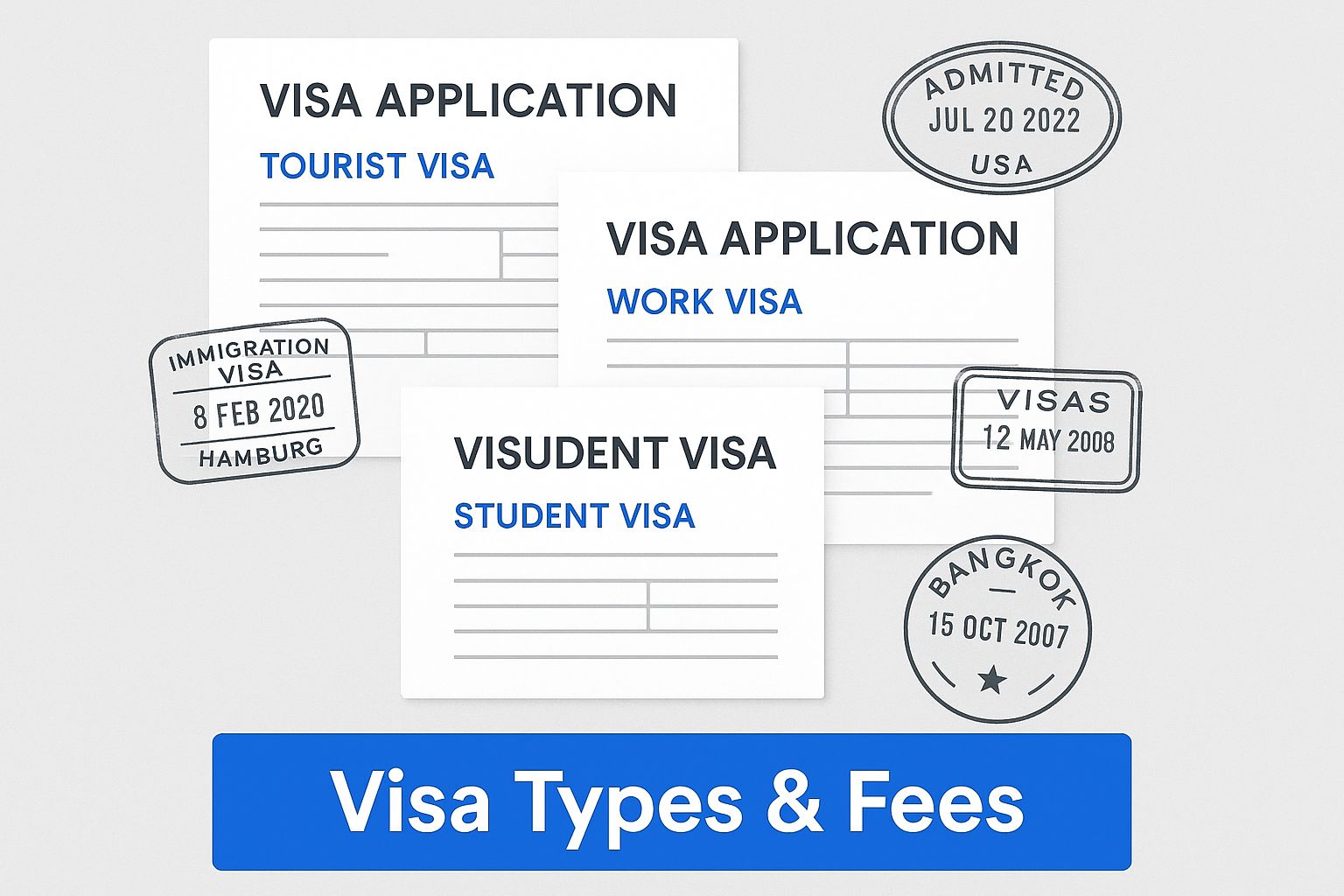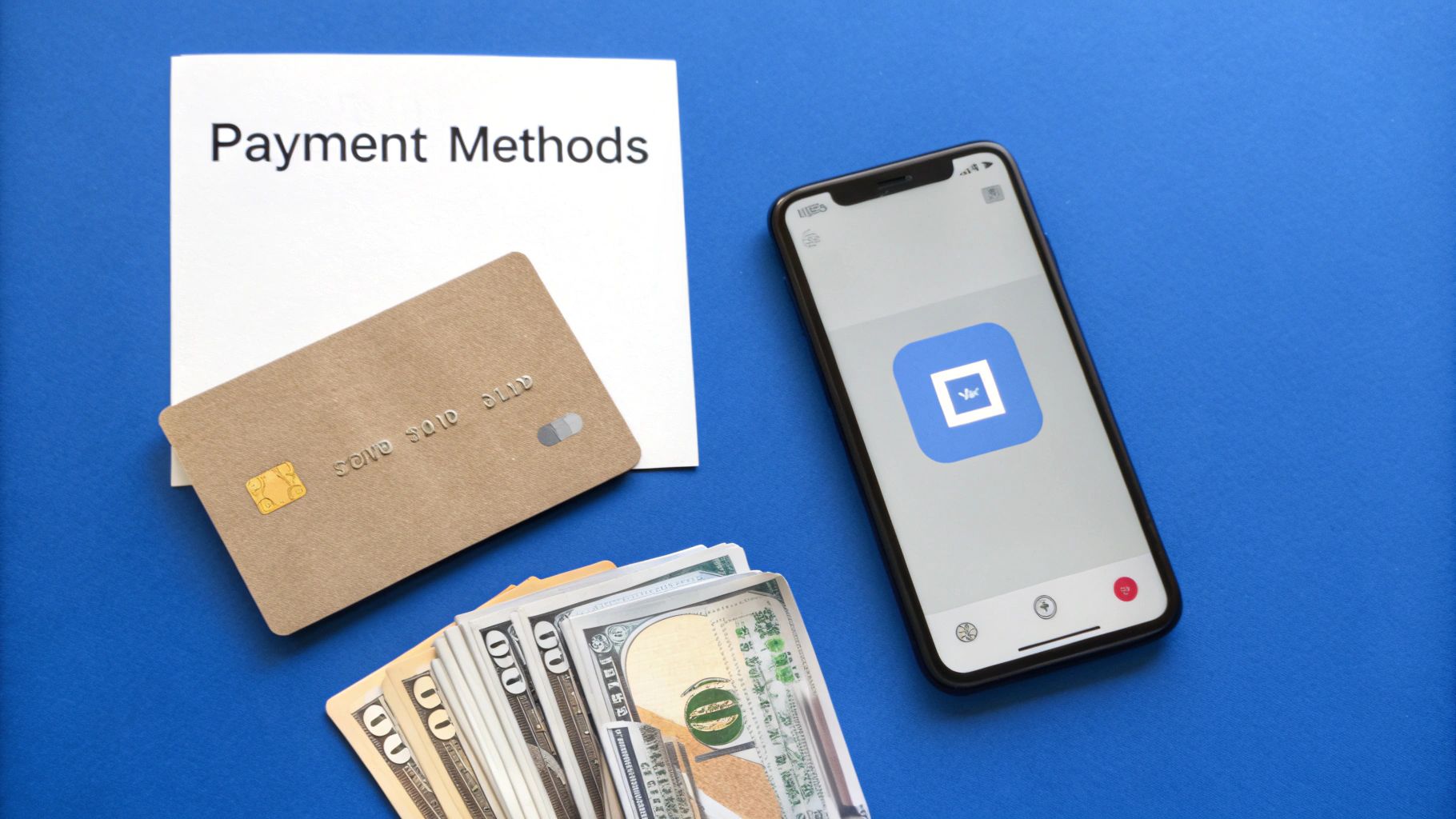How Much Is Canadian Visa Fee in Nigeria? Full Breakdown

Figuring out the cost of a Canadian visa from Nigeria can sometimes feel like trying to solve a puzzle. Let's break it down. Essentially, you're looking at two main, non-negotiable charges to get your application started.
First, there's the application processing fee, which is CAD $100. Then, you have the biometrics fee of CAD $85. This brings your total initial cost to CAD $185. It's crucial to remember that these fees are non-refundable, regardless of your application's outcome.
Understanding the Core Visa Costs

Before you get lost in the paperwork, it's wise to get a firm grip on these baseline costs. Think of them as the gate fees for your Canadian journey.
The application fee is what you pay for an immigration officer to review your case. The biometrics fee, on the other hand, covers the cost of collecting your fingerprints and photograph, which is a standard security step for applicants from Nigeria.
As of September 2024, the CAD $100 application fee works out to about NGN 71,500. The CAD $85 for biometrics is roughly NGN 61,275. This means you should budget for a total upfront cost of around NGN 132,775. Just keep in mind that this Naira figure can shift a bit depending on the daily exchange rate.
Core Canadian Visa Fees for Nigerian Applicants
To give you a clear, at-a-glance view, here is a simple table showing the primary, non-refundable fees you'll encounter for a standard Canadian visitor visa application from Nigeria.
| Fee Type | Cost in Canadian Dollars (CAD) | Estimated Cost in Nigerian Naira (NGN) |
|---|---|---|
| Application Processing Fee | CAD $100 | ~ NGN 71,500 |
| Biometrics Fee | CAD $85 | ~ NGN 61,275 |
| Total Mandatory Cost | CAD $185 | ~ NGN 132,775 |
Knowing these initial figures is the first, most practical step in planning your budget.
These costs are just one piece of the puzzle. For a complete picture of the entire journey, our guide on relocating to Canada from Nigeria offers a wider perspective, helping you see how these fees fit into your overall immigration plan.
Navigating the Different Canadian Visa Costs
It’s a common mistake to think there's a one-size-fits-all price for a Canadian visa. The truth is, the amount you'll end up paying is directly linked to why you're going to Canada in the first place. A simple visitor visa has its own fee, but other, more involved applications come with different price tags.
Think of it this way: your reason for travel—be it to study, work, or reunite with family—sets you on a specific application path. Each path has its own set of administrative hurdles for Canadian immigration officials to clear, and the fees reflect that effort.
A Look at Common Visa Categories
For example, a study permit application will set you back CAD $150. That’s a bit more than a standard visitor visa because the officials need to verify your acceptance letter from a Designated Learning Institution (DLI) and get a clear picture of your long-term intentions.
A work permit application is another step up in complexity, typically costing CAD $155 and sometimes more. This fee covers the detailed background checks required to confirm your job offer is legitimate and that your role aligns with Canada's labour market needs. If you're heading down this path, our guide on how to apply for a work visa breaks it all down.
This image gives you a quick visual breakdown of the most common visa types and what the Canadian government charges for each.

As you can see, specialised permits for working or studying naturally have higher fees than a straightforward visitor visa.
Getting these fees right from the start is absolutely critical. Paying the wrong amount is one of the fastest ways to have your application sent straight back to you. This doesn't just cause frustrating delays; it means you have to go through the whole payment process all over again.
Finally, applications for family sponsorship have their own unique fee structures, which are often higher due to the detailed work involved in verifying family ties and eligibility. To be sure about what you need, it's always a good idea to check the official entry requirements for Canada by country or territory.
By figuring out your exact visa category from day one, you can budget properly and sidestep any needless headaches.
Unpacking the Mandatory Biometrics Fee

Aside from the main application fee, there's another charge that's a mandatory part of the Canadian visa process for most Nigerians: the biometrics fee. It's a common point of confusion, but it’s really just a standard security step. This fee covers the cost of collecting your fingerprints and taking a photograph.
Think of it as Canada’s way of creating a secure digital handshake. This data helps confirm you are who you say you are, protecting both you and the Canadian system by making sure no one else can use your identity. If you're in Nigeria and applying for a visitor visa, work permit, study permit, or permanent residency, you'll need to provide your biometrics.
The cost is straightforward. For a single person, the biometrics fee is CAD $85. You'll pay this right along with your main application fee in one go.
How the Family Cap Can Save You Money
Here's a helpful tip for families. You won't have to pay that CAD $85 fee for every single person if you're applying together as a family unit—say, a couple with their children.
Instead, a family applying at the same time and place pays a maximum total of CAD $170. This can add up to a significant saving, which is always a welcome bit of news when dealing with application costs.
It's crucial to understand that this fee is for the service of collecting your biometrics, not a guarantee of visa approval. The fee is non-refundable, which really highlights how important it is to get your application right the first time.
Once you've paid, you'll get a Biometric Instruction Letter (BIL). You absolutely must bring this letter with you to your appointment at a Visa Application Centre (VAC) in Nigeria. My advice? Book that appointment as soon as you get the letter. It’s a vital step, and getting it done quickly turns a requirement into a simple, stress-free checkpoint on your path to Canada.
Alright, let's talk about the part of the process that makes everyone a little nervous: paying the fees. Getting this step right is crucial. A simple payment error can cause frustrating delays, and nobody wants that.
The only legitimate way to pay your Canadian visa fees is directly through the official Immigration, Refugees and Citizenship Canada (IRCC) online portal. Think of it as the single, secure gateway for your application. Using this portal is the only way to ensure your payment is safely received and correctly linked to your file.
This centralised system is designed to protect you. It helps you avoid the scams and unofficial "agents" that unfortunately pop up. When you're paying online and uploading sensitive documents, you'll also want to be sure your files are protected. It's always a good idea to brush up on proven PDF document security tips to keep your information safe.
Making the Payment from Nigeria
So, how does it actually work? When you get to the payment stage, the amount will be shown in Canadian Dollars (CAD). You’ll use your Nigerian debit or credit card (like a Visa or Mastercard) to pay, and your bank will automatically handle the conversion from Naira to CAD based on their exchange rate for that day.
Keep in mind that these rates change daily. The final amount you see debited from your account in Naira might be a little different from what you calculated yesterday. It's a smart move to give your bank a quick call before you make the payment. Just let them know you're about to make an international transaction to Canada. This simple heads-up can prevent their fraud detection system from blocking the payment, which could seriously disrupt your application.
One critical point to burn into your memory: all visa application fees are non-refundable. Once you pay, that's it. This really highlights how important it is to double-check, and then triple-check, every single detail of your application before you hit that submit button.
For applicants in Nigeria, all payments must be completed online. As you can find out more about on the non-refundable fee policy on the Nigerian High Commission's website, this "no refund" rule applies whether your visa is approved or not. This is why putting together a flawless, well-prepared application from the start is the best investment you can make in your journey to Canada.
Budgeting Beyond the Official Fees
It’s easy to think that once you've paid the application and biometrics fees, you're done with the spending. That's a common trap many applicants fall into. To get a real, honest picture of what your Canadian visa application will truly cost, you need to look past the main government charges. A smart budget includes all the other bits and pieces required to build an application that actually gets approved.
For instance, most people will need to gather several supporting documents, and these aren't free. You might need to get a police clearance certificate to prove you have a clean record or pay for a medical examination if Immigration, Refugees and Citizenship Canada (IRCC) asks for one. And if any of your documents are not in English or French, you'll have to pay for an official translation.
Uncovering Hidden Application Costs
Let's break down some of these other expenses you should probably plan for. Think of them as the behind-the-scenes costs of putting your application together.
Sometimes, you might need certain documents to be officially authenticated or notarised. The fees for this can vary, so it's a good idea to look into the potential costs for document notarization ahead of time.
Then there's the big one: proof of funds. Now, this isn't a fee you pay to anyone, but it's a critical part of your application. You have to prove you have enough money to cover your trip and your stay in Canada. This single factor can make or break a visa officer's decision. This usually means providing several months of bank statements or an official letter from your bank, which sometimes comes with a small fee.
Having a clear view of your total financial commitment is everything. It stops that last-minute scramble for cash and lets you confidently show the visa officer that you're financially prepared for your trip—a major plus for getting your application approved.
To help you get organised, here’s a quick look at some common extra expenses you might run into.
Checklist of Potential Additional Application Costs
This table outlines other common expenses applicants may face beyond the primary government fees.
| Expense Category | Description | Estimated Cost Range (NGN) |
|---|---|---|
| Medical Examination | Required for certain visa types or applicants staying over six months. Done by an IRCC-approved panel physician. | ₦120,000 – ₦180,000 |
| Police Clearance | A certificate from the Nigerian Police Force to prove you have no criminal record. | ₦30,000 – ₦60,000 |
| Document Translation | For translating official documents (like birth certificates) into English or French by a certified translator. | ₦5,000 – ₦15,000 per page |
| Document Notarisation | Having a notary public officially witness and certify copies of your documents. | ₦2,000 – ₦10,000 per document |
| Bank Statement Printing | Fees charged by your bank for printing official, stamped statements for the required period. | ₦1,000 – ₦5,000 |
| Courier & Travel | Costs for sending documents or travelling to the Visa Application Centre (VAC) for biometrics. | Varies by location |
Remember, these are just estimates, but they give you a much clearer financial target to aim for.
Building a complete budget helps you see the entire journey, not just the first step. If you're thinking about a more permanent move, you'll definitely want to check out our deep dive into the full cost of relocating from Nigeria to Canada to prepare for every financial stage of your new life.
Got Questions About the Fees? We’ve Got Answers
When you're sorting out the money side of your Canadian visa application, a few questions always pop up. Getting straight answers is the best way to feel in control and sidestep those little trip-ups that can cause stress. Let’s tackle the most common things Nigerians ask about the costs.
Think of this as a quick chat to clear things up, so you can lock in your budget and submit your application without any lingering worries.
Are Canadian Visa Fees Refundable?
This is a big one, and the answer is simple: no. The money you pay to Immigration, Refugees and Citizenship Canada (IRCC)—both for the application itself and for biometrics—is non-refundable.
What you're really paying for is the service of having your application processed, not for the visa itself. It's crucial to understand this because it highlights just how important it is to get your application right the first time. If your application is refused, that money is gone, and you’ll need to pay the full amount again if you decide to reapply.
Can I Pay My Visa Fees in Nigerian Naira?
You’ll be paying from your Nigerian bank account, but the actual transaction has to be in Canadian Dollars (CAD). The official IRCC payment portal is set up to charge only in CAD.
When you use your Naira debit or credit card (like a Visa or Mastercard), your bank handles the conversion. They'll use their own exchange rate for that day to figure out the Naira equivalent.
Just a heads-up: bank exchange rates change daily and often include small foreign transaction fees. The final amount you see debited from your account in Naira might be a bit different from what a quick search on Google showed you.
How Do I Pay the Biometrics Fee?
Good news here – you don’t have to worry about making separate payments. Even though the visa fee and the biometrics fee cover different things, you pay for them together in one single transaction.
The IRCC online portal makes this really straightforward. As you go through the application process, the system automatically adds up the total cost for you. It will combine the application fee (like the CAD $100 for a visitor visa) with the biometrics fee (CAD $85) into one final amount. This way, you pay exactly what you owe without any guesswork.
Do Children Also Pay the Full Visa Fee?
Yes, every single person applying needs their own application fee paid, no matter their age. So, if you're applying for visitor visas for yourself and your child, you'll have to pay the CAD $100 processing fee for each of you.
But there’s a key difference when it comes to biometrics. Children under 14 years old don't need to give their fingerprints and photo. This means you won’t have to pay the CAD $85 biometrics fee for them, which definitely helps lower the total cost for families travelling with younger kids.
Planning your move to Canada involves many steps, and getting your questions answered quickly is key. With JapaChat, you get an AI immigration expert designed for Nigerians, providing instant, accurate answers to make your journey smoother. Start planning with confidence by visiting JapaChat today.

Leave a Reply